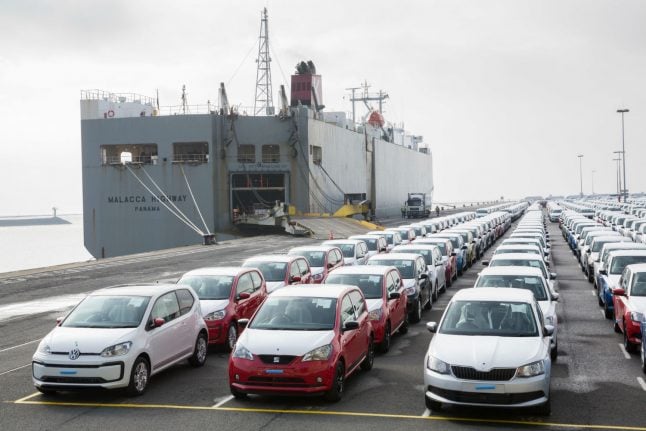As Boris Johnson was set to enter number 10 Downing Street on Wednesday, trade associations warned against a no-deal Brexit, saying it would result in “massive tariffs” and put relations between the UK and the EU on a similar level to that of North Korea.
It came as new figures revealed by the German Chamber of Industry and Commerce (DIHK) showed trade volume between Germany and the UK had shrunk again in 2019 – and that many German companies are looking to invest anywhere but the UK.
For all The Local Germany's Brexit coverage CLICK HERE
Firms from Germany exported goods worth around €35 billion to the UK from January to May this year – a decline of 2.3 percent compared to the previous year. And imports from Britain fell even more sharply – by 6.1 percent to €15 billion.
With a trade volume of €50 billion in the first five months of the year, the UK is currently only ranked seventh among Germany's most important trading partners. Figures show it’s been declining significantly over the last few years – in 2017 it was in fifth position and in 2018 the UK was ranked sixth.
Experts say the main reason for this is the continuing uncertainty surrounding Britain's withdrawal from the EU and future economic relations.
DIHK President Eric Schweitzer and other representatives of the German economy have warned the future British Prime Minister Boris Johnson against a no-deal Brexit.
The former London mayor has promised to seek a new deal with the EU or leave without an agreement on October 31st, the current scheduled withdrawal date, in what would be a ‘no-deal' Brexit.
But the British parliament has rejected a withdrawal deal reached by outgoing PM Theresa May and the EU three times.
READ ALSO: 'Cocky troublemaker': What the German media makes of Boris Johnson
 Boris Johnson outside number 10 on Tuesday. Photo: DPA
Boris Johnson outside number 10 on Tuesday. Photo: DPA
'Massive tariffs overnight'
The European trade association Business Europe has also warned against an unregulated Brexit. The consequence of a no-deal exit would be “massive tariffs overnight”, said the General Director of Business Europe, Markus Beyrer, to Funke Media Group newspapers.
Even if Johnson claims the opposite, he is mistaken, Beyrer said, adding: “Yes, there will be customs duties.”
Beyrer said without a withdrawal agreement, the UK would move from fully integrated EU country status to absolute non-status. “There is hardly a country in the world, perhaps apart from North Korea, that would have an even worse level of agreements with the EU,” he said.
READ ALSO: What complications do Brits face in obtaining German residency permits?
Business Europe is made up of trade associations from the EU states and some neighbouring countries. Germany's Industry association BDI and the employers' association BDA are members of the group.
'Still a chance to limit negative impact'
Yet even without the looming threat of a no-deal, Brexit has already become a burden for the German economy, Schweitzer of the German Chamber of Industry and Commerce said. A total of 70 percent of German companies with business in Britain expected trade to drop in 2019.
Meanwhile, every eighth company with business there wants to shift its investments to other markets – above all to countries in the EU internal market. “
The new British government still has a chance to limit the negative impact of the Brexit on the economy on both sides of the channel,” said Schweitzer.



 Please whitelist us to continue reading.
Please whitelist us to continue reading.
Member comments